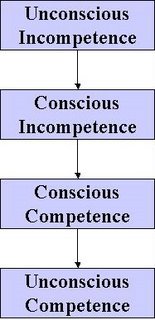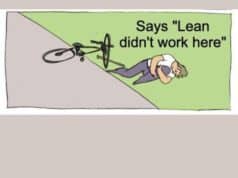I found this in a non-lean book, but I can see how this applies to our lean world, this change model:

Many of the factories I worked with my career were in that first phase — they were “unconsciously incompetent” — they had no clue how bad they were.
The first step in improvement is understanding how you stand, how good are you, how lean are you? When understand you CAN improve, that's “conscious incompetence.” Then, as you improve and try new things comes “conscious competence.” You're better, but having to think about the new practices all the time. Then comes the final phase, “unconscious competence” where those formerly new practices are now a way of life. I guess when lean becomes “a way of life” rather than that “new program”, you've reached a good place.
What do you think? Please scroll down (or click) to post a comment. Or please share the post with your thoughts on LinkedIn – and follow me or connect with me there.
Did you like this post? Make sure you don't miss a post or podcast — Subscribe to get notified about posts via email daily or weekly.
Check out my latest book, The Mistakes That Make Us: Cultivating a Culture of Learning and Innovation:










The hardest part is moving to the conscious incompetence. Companies have great visions for their business or just a process. They know what good looks like. They have benchmarked and know the current “best-in-class.” But they lack a vital ingredient to traverse this great journey – a deep understanding of their current state. We are inherently bad at this. Regardless of the topic, it always seems that 90 percent of people believe they are above average. Only our poor understanding of the current state is behind this obvious paradox.